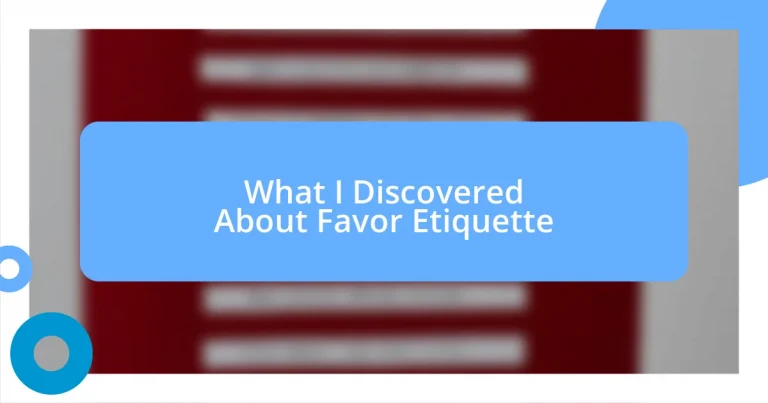Key takeaways:
- Reciprocity is crucial in favor etiquette; showing gratitude for favors strengthens relationships and builds trust.
- Expressing gratitude effectively involves being timely, specific, and using appropriate methods to ensure the recipient feels valued.
- Maintaining healthy boundaries is essential; communicating limits allows for supportive interactions while protecting personal well-being.
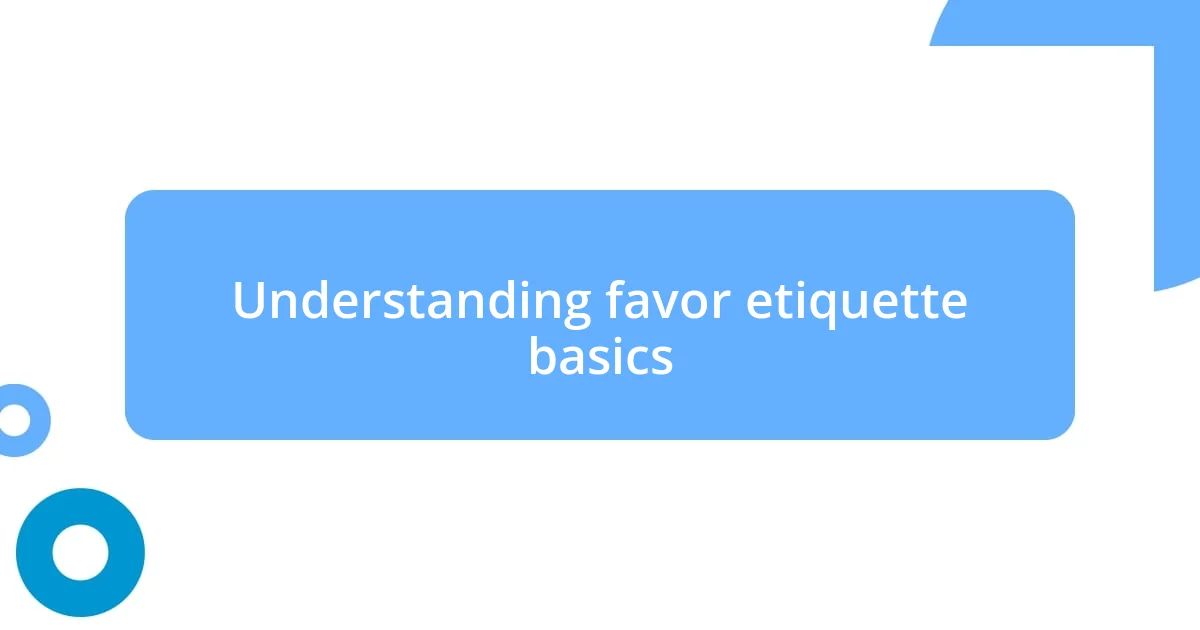
Understanding favor etiquette basics
Understanding the basics of favor etiquette is essential in nurturing our relationships. I recall a time when I asked a colleague to cover for me at work. I felt a wave of anxiety wondering if I had properly expressed my gratitude afterward. It’s amazing how a simple “thank you” can solidify a bond and make someone feel valued.
One of the core aspects of favor etiquette is reciprocity. If someone does you a favor, what’s the best way to return the gesture? I often think about how I strive to be attentive to those around me; even a small act, like offering support or sharing a meal, can be a meaningful way to reciprocate. Have you ever noticed how helping others enhances not just their day but your own sense of community? It’s a beautiful cycle of goodwill.
Moreover, timing matters when acknowledging favors. I once missed an opportunity to thank a friend promptly, and I worried it came off as indifference. It taught me that acting on those feelings of gratitude quickly can strengthen connections. When was the last time you reached out to someone who helped you? Taking that initiative can truly brighten someone’s day!
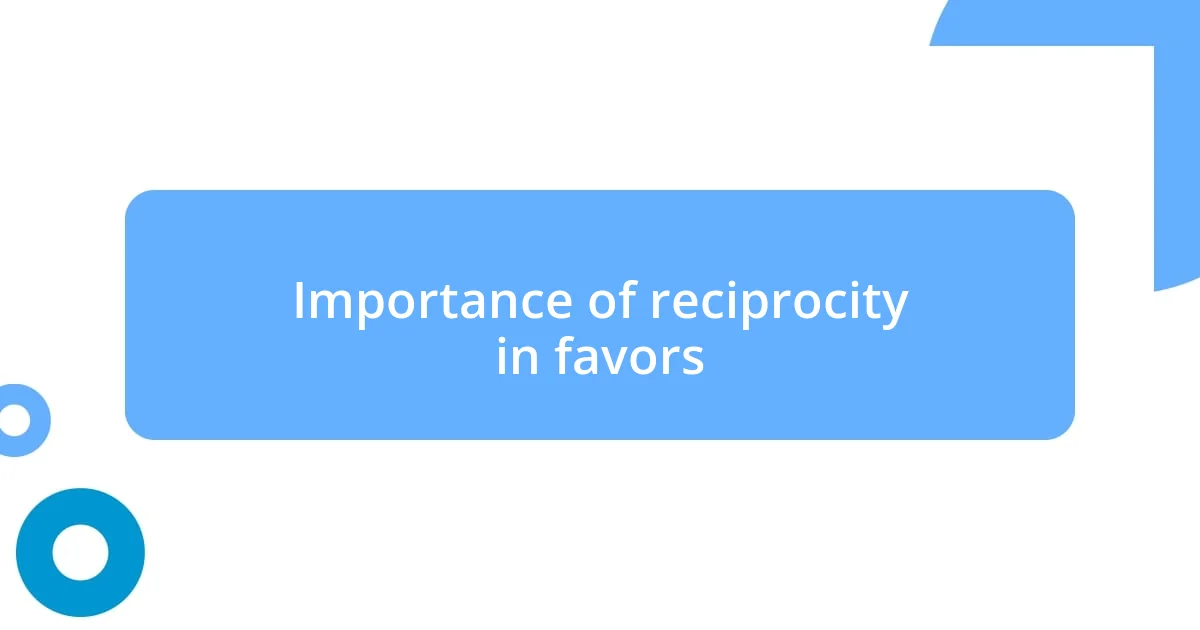
Importance of reciprocity in favors
Reciprocity in favors is more than just a polite gesture; it’s a fundamental building block of trust in relationships. I remember when a friend lent me their car when mine was in the shop. The gratitude I felt was overwhelming. To show my appreciation, I made sure to help him with a home project afterward. That simple favor exchange deepened our friendship and created a sense of mutual support that we both cherish.
It’s essential to recognize that favors don’t always have to be equal in value. What truly matters is the intent behind the action. For example, I once cooked dinner for a friend who helped me with a big project at work. She later invited me to a movie night to repay the favor, even though it was just popcorn and a home film. That night strengthened our bond and reminded me that it’s about the thought and connection rather than the material equivalence.
In the realm of social interactions, neglecting to reciprocate can lead to feelings of unease or imbalance. I had a neighbor who routinely helped me with lawn care. After a while, I realized I hadn’t extended my goodwill in return. So, I decided to offer him some freshly baked cookies as a gesture of thanks. It was a small, simple act, but the smile on his face told me that it meant a lot. In relationships, it’s those little moments of acknowledgment that create enduring ties.
| Type of Favor | Example of Reciprocity |
|---|---|
| Material | Lending a car – Cooking dinner |
| Emotional Support | Lending an ear – Offering a hug |
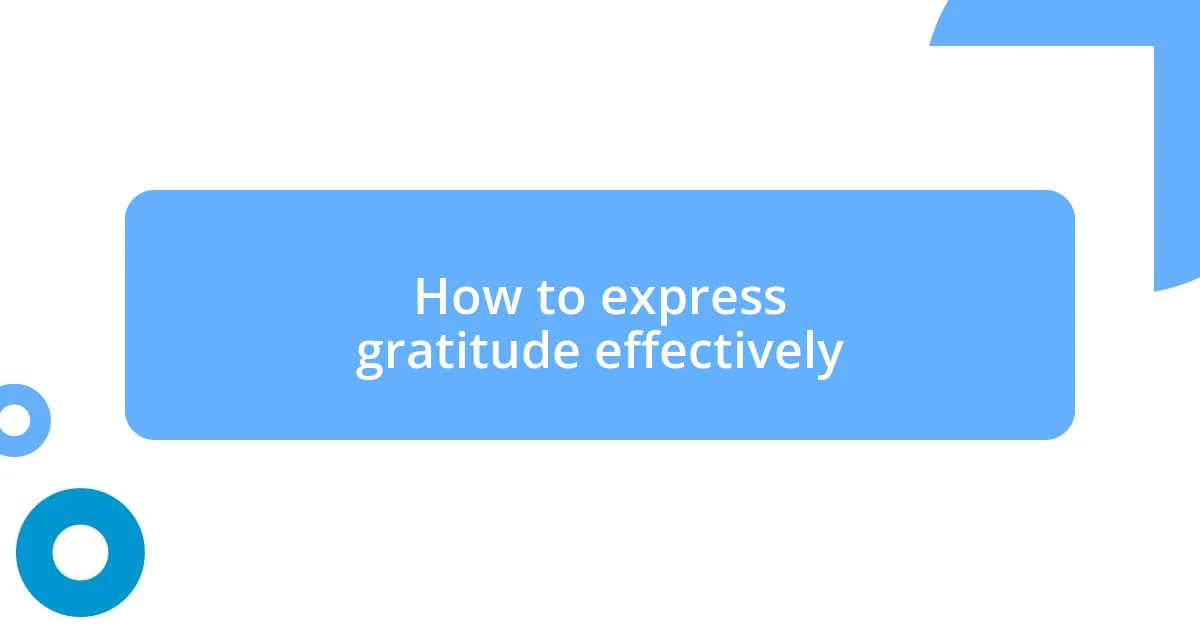
How to express gratitude effectively
Expressing gratitude effectively can be transformative. I remember an occasion when a friend surprised me by organizing a special birthday celebration. To show my appreciation, I sent her a heartfelt handwritten note, detailing exactly how much her effort meant to me. That little gesture wasn’t just about saying “thank you.” It reinforced our connection and made her feel truly valued.
When expressing gratitude, it helps to be specific and personal. Here are a few effective approaches to consider:
- Be timely: A quick thank you, whether verbally or in writing, shows that you acknowledge the effort immediately.
- Be specific: Mention what you’re grateful for. Instead of just saying thanks, say, “I appreciate how you took the time to help me with my project.”
- Follow up: A simple check-in later on can reinforce your gratitude. For example, saying, “I still think about how you made my day!” can keep the exchanges alive.
- Consider small gestures: Sometimes, a small act of kindness — like bringing coffee or treating someone to lunch — can express appreciation beautifully.
- Use the medium that suits your relationship: Depending on your bond, a text might be fitting for casual acquaintances, while a phone call or handwritten note is more personal for close friends.
These thoughtful methods not only convey gratitude but also strengthen relationships, creating a positive ripple effect in your social circle.
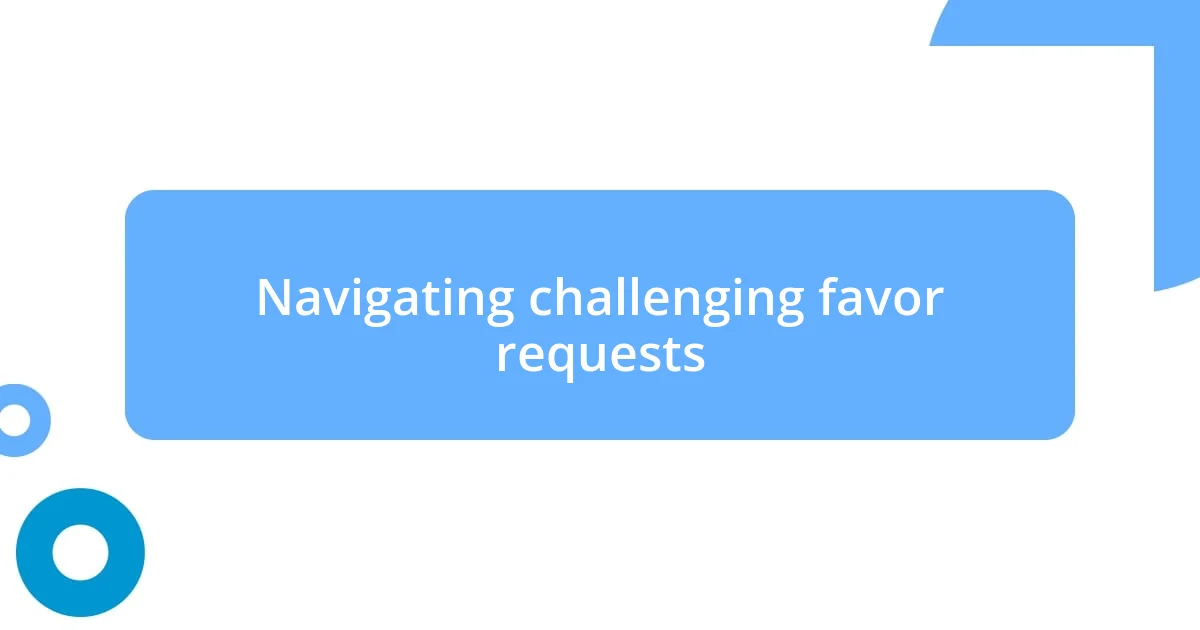
Navigating challenging favor requests
Navigating challenging favor requests can be tricky, especially when the ask feels significant or burdensome. I once faced a situation where a close friend needed me to babysit her kids for an entire weekend. At first, I hesitated because I had my plans, but I realized that stepping in for her could strengthen our friendship. I asked myself, “Wouldn’t I want her to do the same for me?” That mindset made it easier to say yes, and in the end, we both felt closer.
It’s important to communicate your boundaries when a favor feels overwhelming. I learned this the hard way when a colleague asked me to take on a project that was beyond my capacity. I expressed my limitations honestly, suggesting a compromise where I could assist him with specific tasks instead. This approach not only maintained my integrity but also fostered a more respectful dynamic between us. Have you ever felt pressured to agree to something out of obligation? Sometimes, it’s better to advocate for what you can genuinely provide.
Moreover, I believe that offering alternatives can be a helpful strategy. For instance, a friend once asked me to organize a large event, something I wasn’t keen on doing. Instead, I proposed enlisting a group of us to share the responsibilities, which made it manageable and far more enjoyable. This experience taught me that collaboration often turns a daunting favor into a collective effort that everyone appreciates. Have you tried this approach? It can transform the relationship and create a sense of teamwork that strengthens bonds.
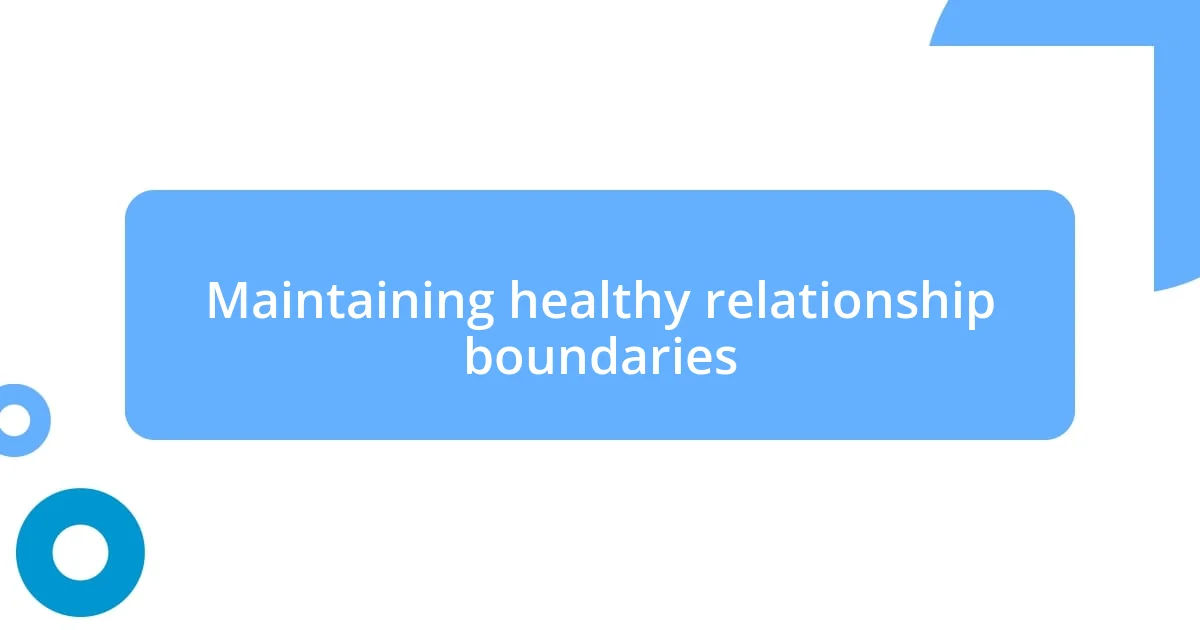
Maintaining healthy relationship boundaries
Maintaining healthy relationship boundaries is essential for nurturing connections while protecting your well-being. I recall a time when I was juggling multiple commitments and felt overwhelmed by a friend’s request for help with her wedding preparations. I wanted to be supportive, but I also knew I needed to prioritize my mental health. So, I decided to have an open conversation with her. I explained my limitations and offered to assist with specific aspects that fit my schedule. This not only clarified my boundaries but also helped her understand my situation better.
Sometimes, it’s about finding the right balance. I learned this lesson when I recently agreed to help a neighbor with a home project, only to find myself stretched too thin between work and personal obligations. It dawned on me how crucial it is to say “no” when something doesn’t align with my capacity or comfort level. I realized that and it made me think, “Am I doing this out of obligation, or because I genuinely want to help?” This reflection allowed me to maintain respect for both my boundaries and the relationship, strengthening our rapport instead of straining it.
Effective communication is at the heart of establishing boundaries. I remember a friend who felt comfortable enough to tell me when my jokes were crossing the line during group gatherings. At first, I was taken aback, but I appreciated her honesty. It encouraged me to be more mindful in our interactions while reinforcing our friendship. Have you ever had a similar experience? Recognizing and discussing boundaries can enhance trust and ensure that both parties feel respected and valued in the relationship.












